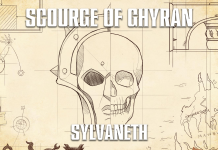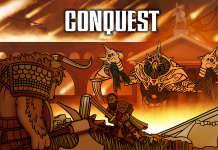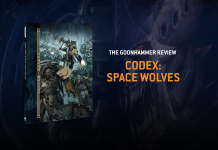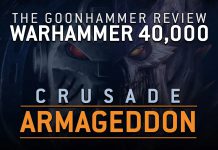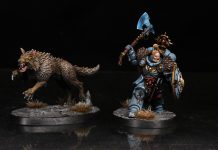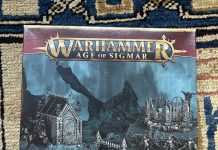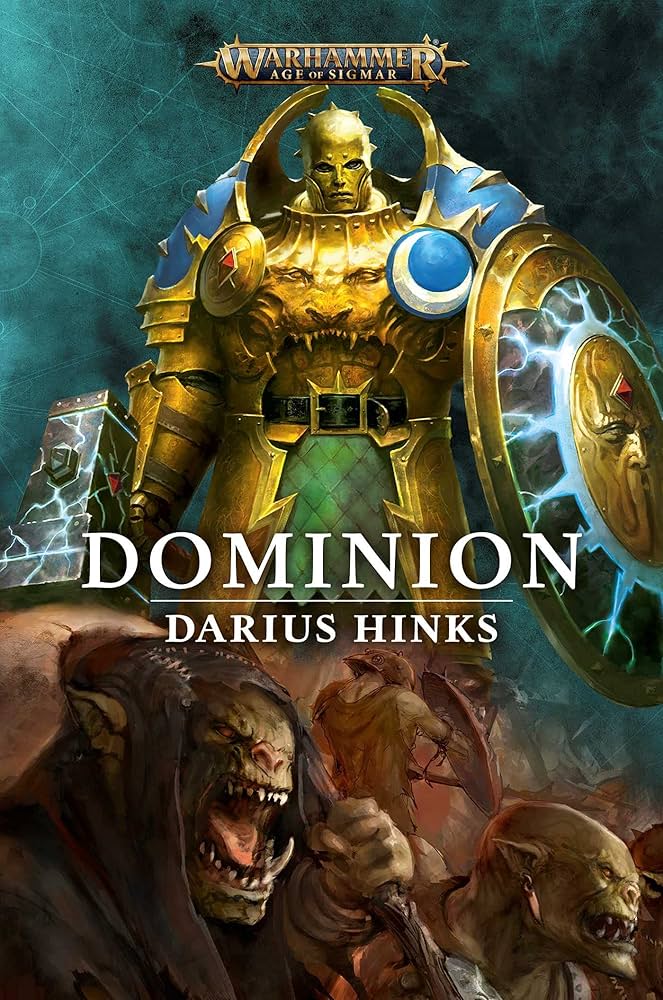With Skaventide by Gary Kloster ushering in the fourth edition of Age of Sigmar, let’s look back at the novel that kick-started third edition; Dominion by Darius Hinks.
Third edition was the era of the beast, so we were treated to a story set Ghur. Niksar lives in Excelsis, a city of Sigmar trying to survive as a bastion of civilization in the hostile environs of the brutal and unforgiving realm of beasts. Life is tough for Niksar (well, this is Warhammer, of course life is tough.) He does whatever he can, often flitting about on the grey area of legality, just to make ends meet. He primarily works as a (not very good) sell-sword but also tries his hand at a bit of wheeling and dealing on the side (which he’s also not very good at).
His sister, Zagora (who, on the other hand, is actually good at stuff) is the only family Niksar has left. The two siblings fled to Excelsis as children when their family were slaughtered by greenskins out in the wilds of Ghur. Zagora has chosen a more noble path as a member of the Phoenix Company, defending the city of Excelsis from the numerous threats that seek to snuff it out.
Zagora discovers that she has been granted certain gits from Sigmar (and we all know that Sigmar’s gifts often end up looking more like thinly veiled curses) and these gifts uniquely qualify her to lead the latest Dawnbringer Crusade into the wilds of Ghur to plant a new settlement.
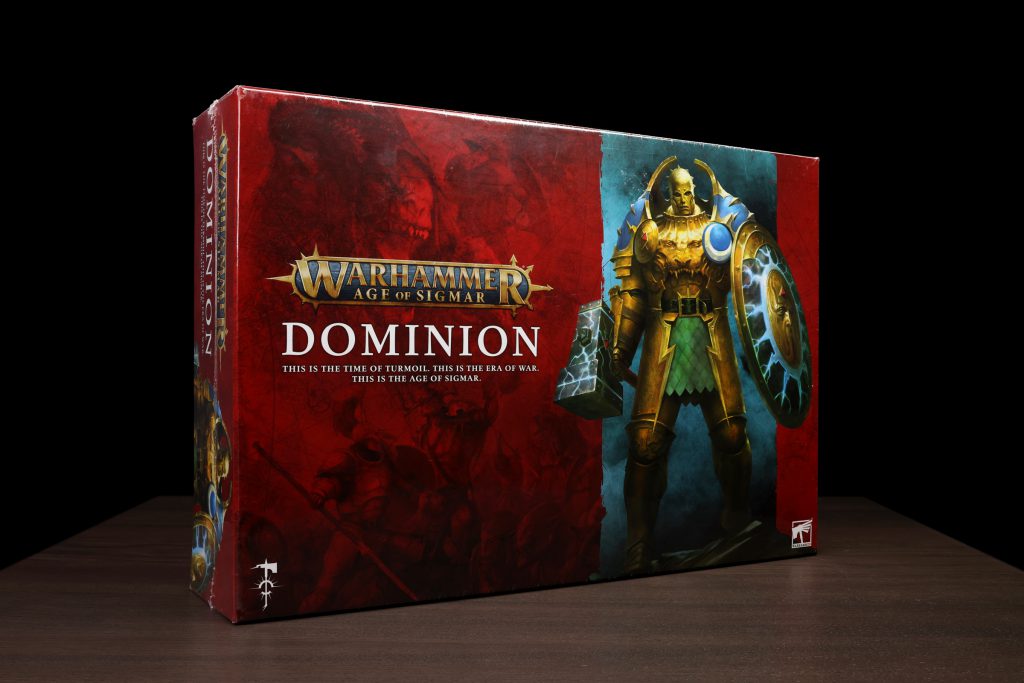
These crusades are, more often than not, merely glorified suicide missions and rarely succeed. However, things are so desperate in Excelsis that many people sign up to take part in them anyway for the chance of a new start and the hope of prosperity and maybe their own little plot land. Niksar is one such person. Through all his wheeling and dealing, he has managed to upset the zealous cults of Sigmar (which is not hard to do) so he signs up to take advantage of the amnesty that all crusades offer to their participants.
I love that this novel focuses on the mortal siblings and is not yet another Stormcast Eternals story. Furthermore, of the two siblings, it follows Niksar, the more deeply flawed, ambitious and relatable one of the two, rather than his charismatic, over-achieving sister, Zagora. Niksar, like most of us, wants to make some sort of impact on his world, but is all too aware of his own shortcomings. This makes Niksar one of the most relatable Age of Sigmar protagonists yet.
We’ve all done that mind experiment where we’ve imagined ourselves in the mortal realms, and wondered how we would get on. The truth is, no matter how much we delude ourselves, none of us are getting chosen as Stormcast Eternals. Most of us would just end up as an orruk punching bag or a skull on a Khornite altar. We’re not Gardus Steel Soul or Neeve Blacktalon; we’re Niksar, torn between loyalty and self-preservation, hope and reality, our own ambitions and our own limitations.
Niksar’s not particularly good at anything, but he finds ways to survive and possibly even succeed, carving out his own niche in a brutal world. He’s not a demi-god imbued with super strength and will, neither does he have extraordinary skills with weapons, shining charisma, or some sort of mysterious arcane connection, as we see with other mortal AOS protagonists – he’s just normal. I’d like to see more of this please, Black Library!
However, if beefy super-humans with big shoulder pads is what floats your boat, then there’s plenty of that with Arulos Stormspear, Knight Arcanum, who comes commanding a detachment of new box-set Stormcasts who are tasked with protecting Zagora’s crusade.
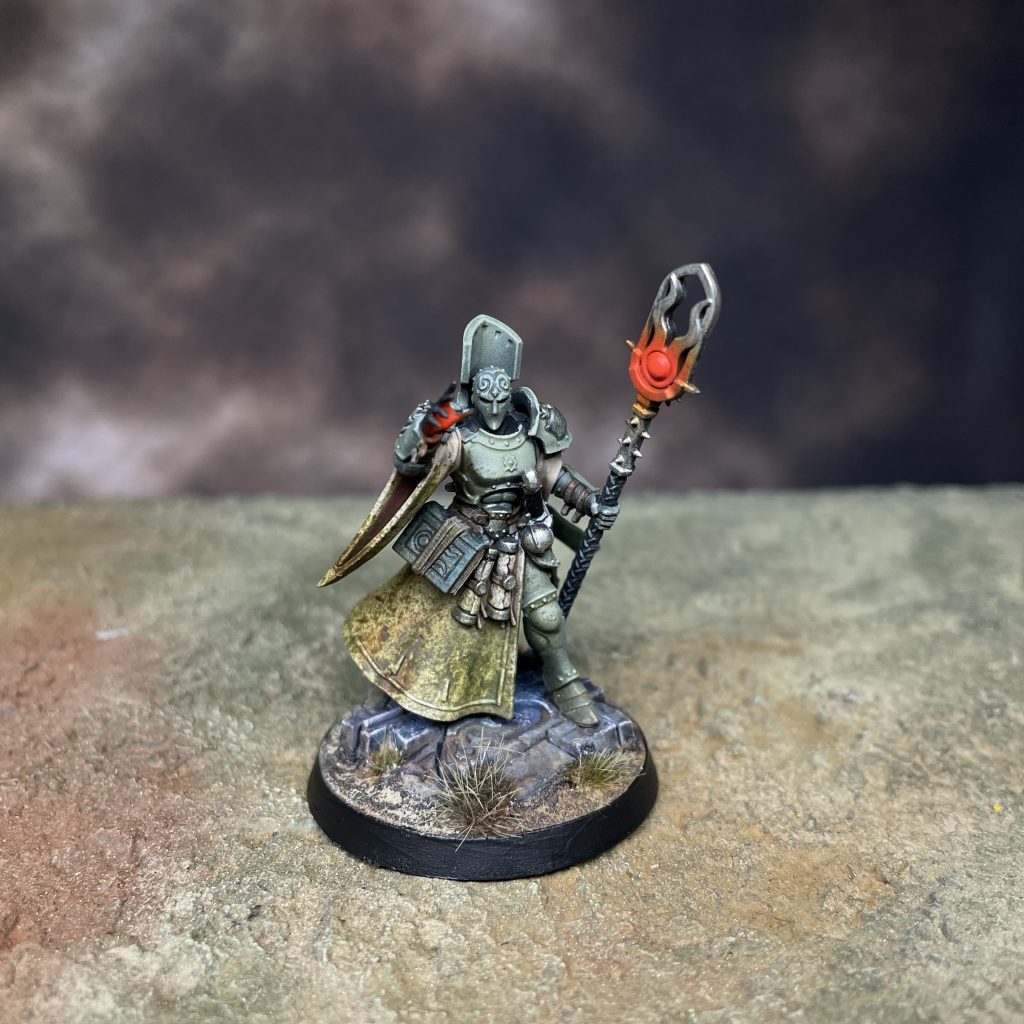
In Dominion, you can see a continuation of Black Library steadily improving how it writes Stormcast Eternal characters. Arulos is a far cry from the slightly hammy Eternals from the RealmGate Wars era, and even more rounded than the Stormcasts of Soul Wars. He does all the struggling with his lost memories, as we’ve come to expect from Stormcasts, but there’s also another dimension to him. He looks at the mortals of the story, not with pitty or hauty superiority, but with something approaching admiration, even jealousy, at their spirit, and it is through seeing this that he is in some way connected to his own humanity again.
The Stormcast end up embarking on their own little mini-quest, as Stormcasts like to do in these novels, in which they investigate the new threat that lies beyond the not-yet-fully-erected walls of the new settlement. Through this, we are introduced to the novel’s primary threat, a new breed of orruk who prefer trickery and cunning over brute force.
Domminion does a great job of introducing the Kruelboyz to the Age of Sigmar universe. Hinks builds the tension masterfully until the point where you are almost relieved to finally come face to face with the grinning and chuckling swamp-dwellers. There are some great scenes of shock and horror, with amazingly effective imagery.
You don’t actually get to learn very much about the Kruelboyz, but I think the book’s opacity makes it all the more effective an introduction. If you want to learn about Kruelboyz society, structure, unit names and weaponry, read the orruk battletome. If you want an uncompromising vision of their character and essence, this books does a very nice job.
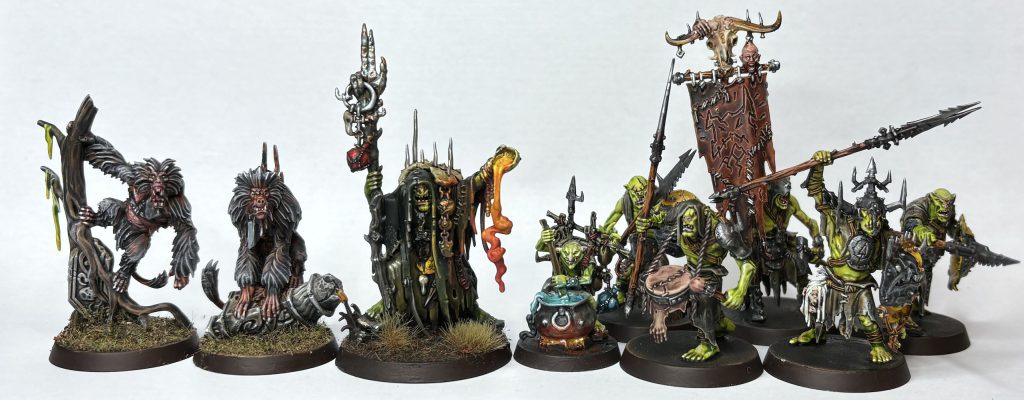
It is also very effective at fleshing out the setting. Ghur is a place where everything scrabbles and strives to eat everything else, so as you’d expect the story meets a number of uniquely terrifying creatures. We even get treated to a very satisfying bit of Kaiju in the middle.
But it’s the treatment of the realm itself that is really fascinating. This is a place where even the very land you step on longs to kill and eat you. In the early chapters we see the earth battling against the city of Excellsis itself, and cracks, both physical and metaphorical, are beginning to appear in this bastion of civilization, making the Dawnbringer crusades even more necessary.
The book is also excellent if you want to learn more about the crusades. It details the kinds of internal struggles crusades go through, with conflicting egos and agendas, as well as the practicalities of moving and building huge cities and fortresses in quite a small amount of time. It’s great to see the slightly absurd inclusion of the massive floating metaliths, stocked with the supplies that the Dawnbringers need.
The whole book is about survival. I know the whole of Warhammer is about survival, but this book portrays this in a particularly visceral and animalistic way. This isn’t about glorious battles and snatching the victory from the enemy, it’s about scrabbling about in the dirt to etch away some sort of meagre existence.
Kolgrimm, the Duarden engineer tasked with building the new city, wants it to be his magnus opus, a settlement to rival even the finest of Sigmar’s settlements; Niksar, however, stares longingly at the nobles, envying them their wealth and prosperity, realizing that the system is rigged and no matter what promises are made to the Dawnbringer pioneers, he will never be able to attain their levels of wealth and comfort. But are such considerations even remotely realistic when everything out there is against you, literally trying to devour you? Is survival not enough!? Must you insist on thinking about enjoying life and achieving great things as well?
Hinks paints a great portrait of human resourcefulness, endurance and spirit in this book. From the banter and story-telling of the soldiers through to the character of Ocella, a friend (as much as he hates to admit it) of Niksar, who finds pleasure in the little creatures and pets she finds along the way, we see the enduring and creative nature of humanity establishing itself even in the midst of inhospitable circumstances.
Dominion has definitely secured itself a place as one of my favourite AOS novels, with interesting characters, compelling plot, something valuable to say, wonderful world building and a truly explosive ending. You wouldn’t go far wrong choosing this as a first read if you’re new to AOS fiction, but it’s also going to be an exciting read if you’re a well-experienced reader too.
Have any questions or feedback? Drop us a note in the comments below or email us at contact@goonhammer.com. Want articles like this linked in your inbox every Monday morning? Sign up for our newsletter. And don’t forget that you can support us on Patreon for backer rewards like early video content, Administratum access, an ad-free experience on our website and more.

![[40k] Competitive Innovations in 10th: Death Beckons pt.1](https://d1w82usnq70pt2.cloudfront.net/wp-content/uploads/2020/01/Analysis_Banner.png)
